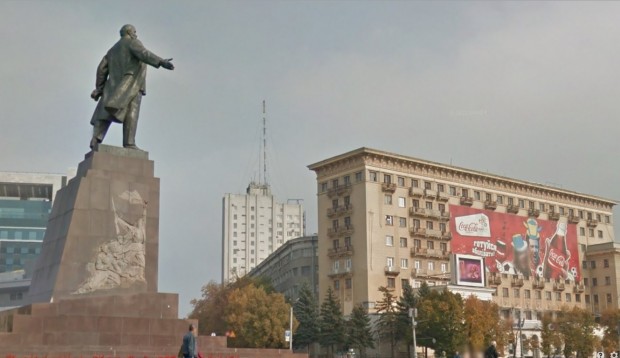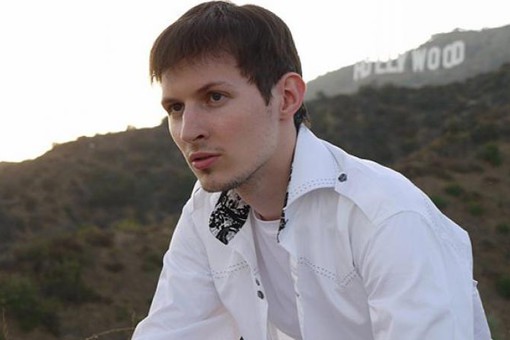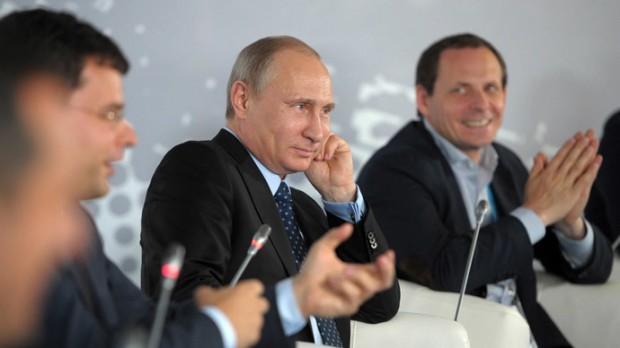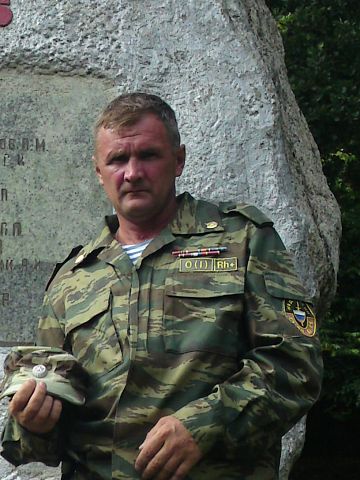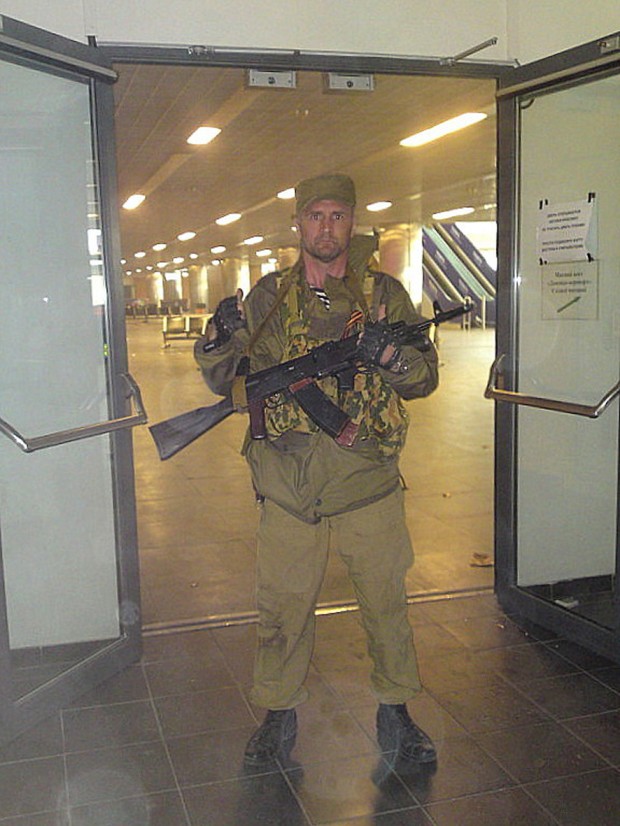Updated Daily. Kremlin propagandists have targeted the State Department’s spokesperson for ridicule in a social media campaign, but it’s not clear if it has genuine resonance. Surveillance of Internet users and particularly bloggers will increase under new Russian laws, although Putin claims he is just “thinking of the children.” Russian independent media has tracked the return of soldiers’ bodies to Russia from fighting in Ukraine, proving that Russian Federation soldiers are present, but the story of an FSB connection for one has been debunked. The murderers of prominent investigative journalist Anna Politkovskaya have been sentenced, but the mastermind behind the assassination has not been found.
For last week’s issue on new Western media investigations of the Kremlin’s paid troll army building on past Russian journalists’ work; the rounding up more suspects in the Bolotnaya Square demonstration case even two years later; Chechen leader Ramzan Kadyrov threats to send 74,000 volunteers to protect Russia’s interests; a lawsuit against opposition member Boris Nemtsov by Russian Railways CEO Vladimir Yakunin for his report alleging corruption in the Sochi Olympics; the break-up of the gay parade in Moscow; and the funeral of Andrei Mironov, translator slain in Slavyansk go here.
For last week’s issue on the critical review of Glenn Greenwald’s book No Place to Hide by noted Russian intelligence and cybersecurity expert Andrei Soldatov; another court case lost by an NGO challenging the prosecutor’s designation of “foreign agent”; the Russian Constitutional Court ruling that a gender studies center is exempt because scholarly work is exempt; commentary by former Central Bank official and Kremlin critic economist Sergei Aleksashenko about how the West has deliberately made sanctions against Russia ineffective; threats of jail for Navalny for using the Internet; and a billboard campaign against the opposition as “fifth columnists,” go here.
Please help The Interpreter to continue providing this valuable information service by making a donation towards our costs.
June 14, 2014
2016 GMT: Opposition member and former deputy prime minister Boris Nemtsov has written a comment on his Facebook about the riot in front of the Russian Embassy in Kiev. The Interpreter has provided a translation:
Hooligans in Kiev organizing a pogrom at the Russian Embassy are really helping Putin. Just like the idle Ukrainian police. I think they are being awarded now by secret decrees, just like the propagandists for the annexation of Crimea were rewarded in their day.
People have already forgotten the downed airplane, the kidnapped journalists, and the new victims in Donetsk and Lugansk. The picture of overturned, smashed cars and explosives thrown on to the grounds of the embassy are exactly what the Kremlin needs in order to justify its aggressive actions regarding Ukraine. Poroshenko is simply obliged to restore order and punish those guilty of the provocation.
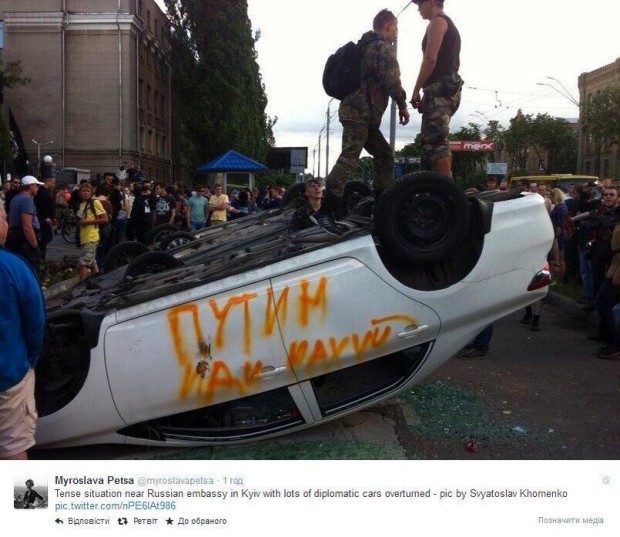
June 13, 2014
2109 GMT: Is Jen Psaki really the Russian Internet’s No. 1 Enemy?
You would think so with the numerous tweets ridiculing the State Department spokesperson (@statedeptspox) and posts about the phenomenon written like this one at Global Voices by Kevin Rothrock and this one by Max Seddon at Buzzfeed. Are we seeing yet another round of the Kremlin’s Troll Wars? Or is this genuine sentiment?
A week ago Psaki was a trending topic on Twitter in Moscow; now the furor has died down some what but it’s still producing concentric waves.
Did you know that 'Псаки' was Trending Topic on Friday 6 for 15 hours in Moscow? http://t.co/XiYNCnnBOE #trndnl
— Тенденции Москве (@trendinaliaMOW) June 6, 2014
Except…is it really the case that tens of thousands of Russians are genuinely indignant about the statements Psaki is making about Ukraine — usually debunking the Kremlin’s own propaganda, but occasionally with some lapses? Do they really enjoy making her the butt of endless jokes based on her supposed propensity for blunders, such as supposedly speaking of “the shores of Belarus” (it’s land-locked, but she never made any such statement) or her inability to explain the term “carousel voting” (it’s true she couldn’t come up with the definition, which involves officials busing voters to multiple precincts so they can vote repeatedly). Is the anti-Americanism in Russian now reaching such a feverish pitch that this kind of vilification of the face of the American
government really becomes possible?
Some of the accounts mocking @statedeptspox as Psaki is known on Twitter are anonymous or new; others have established pseudonyms but have reached the 2,000 follow cap and have difficulty growing bigger — so likely they make more accounts. These types of troll accounts form the substrate for the viral phenomenon that others, whether officials or pro-government journalists and bloggers can seed into social media. “Psaki” hasn’t tapped into a wide enough base of “real people” to be trending more or have more accounts showing RTs of the pictures.
Псаки не привела доказательств присутствия российских войск на Украине
http://t.co/WBR4aM14fM pic.twitter.com/LeiMZpn3Fm
— Донецкая Республика (@dnrpress) June 3, 2014
Translation: @dnrpress Psaki did not cite proof of the presence of Russian troops in Ukraine.
Оба-на! #Кличко #Псаки pic.twitter.com/XoYOO4ITTN
— Alex V (@wmk2u) June 4, 2014
Translation: @wmk2u Both of you–go on!
Caption:
Today the marriage of V. Klitschko and J. Psaki took place according to Jennifer Psaki
Balloons: (Klitschko) In this situation not everyone could do it! But not everyone is looking to the future?
(Psaki): I’m married! I myself don’t really understand what it is. I will find out from the experts.
1950 GMT: How can we determine if a supposedly “viral campaign” is authentic, and not astro-turfed by PR gurus manipulating social media or worse, state propagandists paying people to tweet pre-fabricated hate comments to incite the mob? The reason Rothrock and Seddon may not agree on whether this is completely contrived or not is because they don’t have mutually-accepted criteria for how falsehood and authenticity are determined — and these could be predicated on their own politics.
Various methods have been developed to assess the activities of Kremlin trolls — one method is to see which accounts actually upload certain widely re-tweeted pictures first, and also to watch how and when accounts and groups are made.
A search of the pictures of Psaki on Twitter show that indeed, the accounts already associated with pro-Kremlin propaganda and anti-American invective, like one with Stalin as his avatar and 20,000 followers, are the ones uploading the pictures.
Some people might say Psaki would have to expect trouble on the Interwebs when she was photographed in a bright pink Russian ushanka [fur hat with ear-flaps]. But in fact, her counterpart from the Russian Foreign Ministry, Mariya Zakharova presented it to her during an exchange of funny gifts to ease tensions before talks in Paris, and she couldn’t have gracefully refused it. The photograph was uploaded to the State Department’s Flickr page on 13 January 2014. It did not get much attention at the time although there was one news story.
The US Consulate in Vladivostok was the first to post it on Twitter that evening, 13 January, and also the State Department’s Russian-language account @UkrProgress , and no one thought to ridicule it or even retweet it at all back then. It got only one “favorite” in English and in Russian, just 5 replies and a mini-debate about whether it was really a true Russian shapka (fur hat) or not.
State Dept Spokesperson Psaki in Russian hat with her Russian counterpart, her boss Kerry and Russian MFA Lavrov. pic.twitter.com/VeWXWOrgEK
— Консульство США/ДВ (@usconsvlad) January 14, 2014
That photo formed the basis not only for many original sayings, but also further photo-shopping such as this one with a photo-bombing Putin in a fake campaign to “get Psaki’s job back” after she was supposedly “fired”:
.@WalkingstickMtn @statedeptspox Nobody will say truth, but Lavrov knows about Psaki everything you need to know pic.twitter.com/o46antDSzz
— Sergei Kostigoff (@kostigoff) June 6, 2014
Возвращаем Псаки в Госдеп… pic.twitter.com/2BrERFdEwU
— Правдивая ПРАВДА (@Pravdiva_pravda) June 5, 2014
Translation: @Pravdiva_pravda We are bringing Psaki back to the State Department.
Caption: Hi, everyone! Vladimir Putin here, and today we are going to bring Psaki back to the State Department.
Another way to determine if a meme has staying power as the authentic voice of the people is to check whether and how many groups are made on Facebook or VKontakte. It’s telling that while Facebook has been widely-used by Russians of liberal, left and conservative political views — from Boris Nemtsov to Aleksandr Dugin — there isn’t a single group made about Psaki by Russians or anybody for that matter — there’s only the automatic page generated by the system for public figures.
On VKontakte, there are 28 groups, as Rothrock pointed out, as if the phenomenon was larger than once described and growing, although to date it stands only at 33.
But a closer look reveals that most of the groups have only one member in them, or no more than 17. And the top 3 or 4 with several thousand aren’t so active. The largest, at 3,133 members currently, has a picture at the top with a sign photo-shopped in saying “Want the United States to Fall into 50 States?” and a message that if people would like the US to fall apart, they must reach 10,000 re-posts of this picture. So far, there were only 40 “shares” and 578 “likes” — hardly a tidal wave.
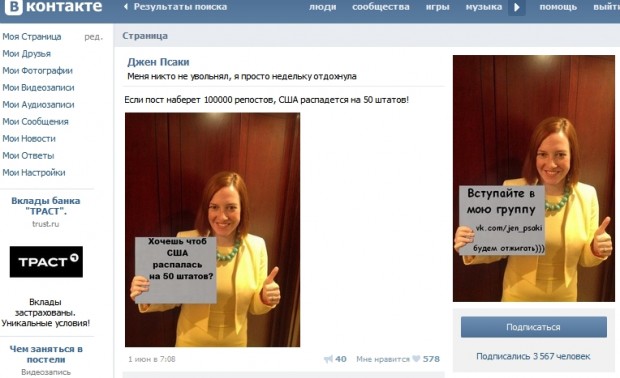
Psaki herself responded to the contrived furor on Twitter with a simple reminder that propaganda is what lay behind most of it:
Despite the Russian propaganda machine suggesting otherwise..I am still here as is a strong, democratic Ukraine #dontbelieveRT
— Jen Psaki (@statedeptspox) June 6, 2014
1909 GMT: How can we tell if Russian public opinion or even the opinion of the intelligentsia is authentic, in a society now mainly subject to manipulated state news? We already know that when we measure public attitudes in polls, we aren’t so much performing sociological surveys as in fact doing audience research for state broadcasting about the effectiveness of its programming. Measuring social media also has to take into account the extraordinary lengths the Kremlin has gone to in order to control the discourse with hordes of paid commenters, loyalist bloggers and then simply bots.
Various scripts have been developed to try to determine if accounts are authentic or not, based on usually hidden algorithms related to location, times of tweeting, sentiment in the tweets, RTs, etc but they can be very misleading.
One way is to do a simple Google search and see just how widespread the “meme” is and what kind of sources are replicating it. As Max Seddon found:
“There’s just one problem: The meme doesn’t really seem to be catching on. Most of the few hundred Google results for Russian-language word searches are references in Russian media to the supposed phenomenon.
Much of the online campaign around the meme, like this video posted by pro-Kremlin blogger and former lawmaker Konstantin Rykov, is infantile and nonsensical in a manner that recalls the handiwork of pro-Putin trolls.”
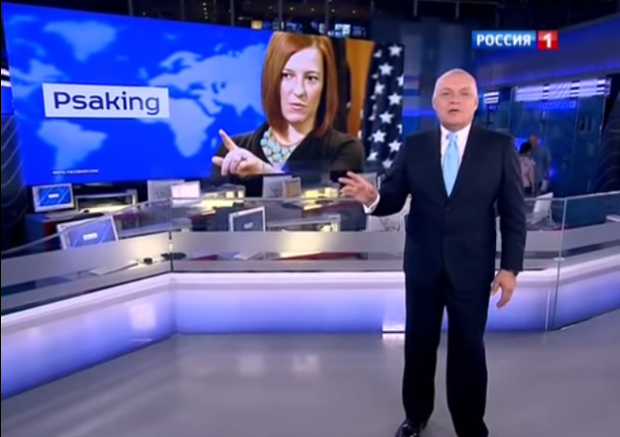
Screenshot from Dmitry Kiselyev’s broadcast inventing the term “Psaking,” which for him means “low-quality American diplomacy” in action.
Another method to check for authenticity is to look at the few remaining independent stations and websites and see if independent voices on their own are contributing to the meme. Slon.ru, for example, reported the story of the phenomenon in a straightforward manner, as a government campaign, and didn’t indulge in the ridicule that state media did.
Vitaly Portnikov, an independent blogger, wrote on Facebook (The Interpreter has provided a translation):
“The press secretary of the State Department, Jen Psaki, hated by Russian propaganda for her precise and clear definitions of Kremlin policy, refuted the report about her resignation. What was illustrative was that this report only appeared in the Russian media, and the main newsmaker turned out to be for some reason the infamous Vitaly Churkin (ambassador to the UN).
But the main thing is why Russian ‘journalists’ decided to sent Ms. Psaki into retirement. And that’s because they noted that her assistant who conducted the briefing, had a similar necklace. And they decided that Psaki had left the job and gave her the necklace, like passing on the red banner. Once again, it must be noted that we are dealing with a conspiracy of dunces.”
A few people responded to his post in the comments by uploading videos ridiculing Psaki, but many also applauded Portnikov’s take and found it outrageous that Russian state journalists would have imagined that there was such a ritual in a supposed changing of the guard, and also supported the idea that she was being attacked because the US has exposed Russian lies about Ukraine.
To be sure, one popular blogger picked up the theme which is the sort of example that skeptics might cite to say that it’s not Kremlin-orchestrated:
А Псаки не пробовала вместо дум о кремлевских пропагандистах иногда читать книжки. Ну или хоть википедию? http://t.co/jhZzKlcBLW
— Maria Baronova (@ponny1) June 11, 2014
Translation: @ponny1 But did Psaki not try instead of thinking about Kremlin propagandists to sometimes read books? Or at least Wikipedia?
Except this blogger may be grabbing the theme to show her independence from American politics, with which older dissidents have been associated to their peril as “foreign agents,” part of not only ensuring popularity in a base increasingly turning to Russian nationalism and establishing a safer identity as Putin critics by also finding Obama morally equivalent. The Psaki meme enables them to color, but inside the lines.
And another avid Twitter user, Vitaly Sapelkin, a United Russia party activist from Novosibirsk with 20,000 followers also participated in the anti-Psaki campaign with a caricature that appears to have been used first on state TV and newspapers (The Interpreter has supplied a translation):
Из-за большой лужи, пришла хорошая новость – мы сохранили Псаки. Ждем 3-го сезона stand up show #SavePsaki pic.twitter.com/LRnaZ2UUdI
— Виталий Сапелкин (@Sapelkin) June 6, 2014
Translation: From across the great pond comes good news — we saved Psaki. We’re waiting for the 3rd season of the stand-up shown #SavePsaki
Cartoon: (top to bottom, L-R)
I don’t know something. But what it is concretely I DON’T KNOW
My hand
Why did Volodka shave his mustache?
What is this turning in my head? [image of a carousel]
Where the f is Norway?
What is that?
Oh, yes. It’s my hand
Was he just enthusiastically following the ruling party instructions?
The true test of a meme is whether it finds its way off a facile RT on Twitter and gets more deeply into other cultural avenues. And here, another argument in favor of anti-Psaki authenticity is a poem making the rounds of Facebook now by the Soviet-era “1960s generation” poet Yunna Morits titled, Vsyaki Psaki [“All Kinds of Psakis”] taking advantage of the rich rhyming potential of this name and the seeming zeitgeist of the hour blaming her not only for malapropisms but war-mongering. The poem had 604 likes, 184 shares, 51 comments. The Interpreter has attempted a translation of the first stanza:
“Who set Ukraine against Russia? … Someone dumb.
Turning Russia into Iraq – there’s no way
Where a Pole decorated an occupiers’ bouquet
Whose underground prisons are a beacon of freedom!”
Yet Morits has a long history of such positions; in the poem featured on Wikipedia, she slams Westernization (Pizza Hut) and speaks of the “Damned Demo-Craps” in the cadences of a perfect Soviet perestroika liberal dismayed at both socialist ideals crashing about her and hated Western culture and capitalism encroaching — although her fellow citizens were happy to embrace them. She’s now in sync with the kind of anti-Westernism Putin routinely conveys in his frequent interviews for state news. Is it actually impossible now to untangle the traditionally honorable Russian intelligentsia from Kremlin social engineers?
The day opposition poet Dmitry Bykov pens a lyric about Psaking is when we can declare it as really “arrived.” But he hasn’t.
Anthropologists of social media have developed complicated theories and sophisticated tools like nodelist to track social media activity, such as this study here of comments during a protest in Azerbaijan. Such methods might turn up the activity of pro-government — or for that matter, pro-opposition bots. Yet it is always hard to be sure that behind the screen is a real person, or that behind the RT with a seemingly prefabricated government slogan isn’t a paid propagandist but in fact a genuine sentiment.
A program called Bot or Not developed at the University of Indiana purports to sift through factors like time-stamping, sentiment, and friends to determine if a user has a chance of being a bot with automated tweets. This week @statedeptspox had a 50% chance of being a bot; by contrast @catfitz was 32% likely to be a bot; last week it was 28%. @MillerMENA is only at 27%; RT.com’s @GrahamWP_UK is at 52% and its editor-in-chief @m_simonyan is at 24%; the infamous deputy prime minister @rogozin is at 39%.
At this point, the available social media footprint on the Psaki attacks lets us know that it is primarily orchestrated by the Kremlin’s troll army. Those few dissenting voices who picked it up did not discover it on their own but were led to it by a social media space saturated with re-tweets by operatives and bots.
1900 GMT: Look, when there’s a real Russian meme not organized by the Kremlin, you can tell. Like the latest meme of Prime Ministry Dmitry Medvedev, posed in various satirical settings:
#гробики pic.twitter.com/IMYnhi9h3g
— Reincarnation. (@TukvaSociopat) June 12, 2014
Translation: @TukvaSociopat Little coffins [photo of Russian soldiers’ coffins from the war in southeastern Ukraine].
Except, this meme may be getting a boost now from Western critics of Putin’s aggression in Ukraine:
Medvedev: We're bringing back Communist era store shelves to a grocery store near you! #MedvedevSelfie pic.twitter.com/ASX4zlIr8d @JerryPopowicz
— Euromaidan PR (@EuromaidanPR) June 11, 2014
#MedvedevSelfie #Medvedev #Selfie: "This is too primitive. Let's send them better stuff now." pic.twitter.com/G0r6UkohkP
— djp3tros (@djp3tros) June 11, 2014
June 11, 2014
2009 GMT: Did you see that photo of what seemed to be the ultimate in loose nukes floating around on Twitter in the last week?
Ian Bremmer was one of the many who retweeted — and then deleted — this shocking snapshot from the floods in Altai, Russia — because it turned out to be something other than what it seemed even after getting the Reddit treatment on the forum A Normal Day in Russia. (The tweet is retrieved here from Google cache).
Moscow Times reported that it was an empty shell from an old missile:
“A deputy chief of the military research and production center “Altai,” Nikolai Dochilov, said the missile was likely a relic of a nearby abandoned military facility that used to fill the missiles with fuel, the report said.
Missiles of this type were decommissioned in the early 1990s and their remains were mostly destroyed, but several unused sections were left behind and appropriated by local residents, Dochilov said, according to Itar-Tass.”
There was no danger from the bizarre item, local authorities said. The Kremlin’s propaganda outlet RT.com embellished the story further with various local stories — that a man had made a garden tank out of the vessel, or that a family used it for a dog kennel:
“‘The Biysk plant uses such rockets, and when they are no longer needed sells them out,” Tatyana Zhdanova, whose family owns the tube, told the website. “Ours got away during the flood. Broke the fence and floated away along with the dogs, who were hiding inside.'”
Yes, there’s a YouTube, but if you click on it, God will kill a kitten:
1851 GMT: Vladimir Medinsky, the Russian Minister of Culture, is increasingly acquiring the reputation of a hard-liner and hypocrite who is the latest Putin crony to quote for outrageous sayings. Today, Russian-American author Masha Gessen reports that Medinsky has said that having two passports is aking to “attempting to have two male parents”. Recently, a new law was passed criminalizing dual citizenship.
Then Russian-language BBC reported today that Medinsky did not approve a rental license for film about the deportation of the Chechens and Ingush in 1944 — which means it is banned for public showing. The director, Ruslan Kokanayev said he did not understand the reason for the ban, but cited a letter from the minister saying that “demonstration of this film will foster incitement of inter-ethnic enmity.”
The letter also said that a central episode of the film — the mass burning of residents of the mountain village Khabakh — was “a historical fabrication” although regional and Western scholars have maintained that it occurred.
Maria Lipman has an article on Medinsky in the current issue of the New Republic. She describes the new Foundations for State Cultural Policy document issued in April:
“The ministry’s document, laying out ideas for Russia’s official culture policy, was published in the leading pro-Kremlin daily, Izvestia. It is interspersed with quotes from Putin’s articles and speeches, just as Soviet government programs drew on Marx and Lenin. Since Putin had earlier condemned European multiculturalism and dismissed the policy of tolerance as ‘neutered and barren,’ so the cultural policy blueprint includes ‘a rejection of the principles of tolerance and multiculturalism.’ Following Putin’s lead, the document emphasizes Russian ‘traditional values’ and cautions against any kind of art that may be at variance with those values. Contemporary art is deemed especially suspicious: ‘No experiments with form,’ the documents warns, ‘can justify the substance that contradicts the values traditional for our society.'”
Medinsky is known for reactionary positions such as insisting that “Russia is not Europe” and denying that Pyotr Tchaikovsky was gay. He’s also become infamous as the recipient of an honorary fellowship from an Italian university which led to protests from professors and students. The award seems to be related to a generous gift from the Russian government for the creation of a Russian cultural center. Activists at Dissernet also claim his dissertation has been in part plagiarized and non-existent sources are cited in it.
1737 GMT: Last week on Pushkin’s 215th birthday, an American author and supporter of EuroMaidan wrote:
#Ukraine: 50 monuments to Lenin destroyed, but none of Pushkin. It's not Ukrainians vs Russians, but Russians & Ukrainians against Soviets.
— Julia Davis (@JuliaDavisNews) June 5, 2014
So it seemed that Ukrainians were distinguishing the Russian people from their government, so to speak. Then there was this response from a supporter of the Russian separatists:
@JuliaDavisNews @catfitz pic.twitter.com/jYb1cyjAkd
— Ukraine Failure (@UkrFailure) June 6, 2014
The graffiti sprayed on the statue says “Vata should gather here.” Vata or vatnik is a pejorative term used in Ukrainian for Russians, based on the word vatnik that means quilted cotton jacket of the type labor-camp inmates or low-class workers wear.
We followed up with some local residents to see if in fact this monument in Poetry Square in Kharkiv really was really defaced — photoshopping is all too common on Twitter. In fact, we were told, the statue did have some graffiti, which seemed to be “a deliberate provocation from anti-Maidan forces.” It was quickly cleaned and remains free of marks for now.
Meanwhile, Lenin’s statute in Freedom Square in Kharkiv remains on his feet, protected by pro-Soviet demonstrators this year. There are all kinds of influences on the city, however, and he seems to be pointing to an ad for Coca Cola.
Pushkin's birthday: 215. Berdyayev says he was the last Ru intellectual who criticized the power while still identifying with state…
— Kadri Liik (@KadriLiik) June 6, 2014
1246 GMT: Russian investigative journalist Irina Borogan published an article 5 June at Ezhednevny Zhurnal (ej.ru) titled “Law on Bloggers Has Turned Out to be A Law on Surveillance.”. The Interpreter has translated an excerpt:
1 August may become a decisive end to anonymity for users of social networks in Russia. If sub-legal acts [regulations] developed by the Ministry of Communications and Federal Security Service in addition to the so-called blogger’s law will be passed, then Facebook, Google+ and other popular postal services must provide Russian intelligence services information about users and information about their contacts upon request, without a court order.”
Ej.ru itself is a web site that has been blocked by the prosecutor at the request of Roskomnadzor, the state censor, although Russians have used circumvention software to get around it.
Essentially, says Borogan, “the dream of Russian silovoki [law-enforcers] about uncontrolled monitoring of social networks and the identification of users has come true.”
Even so, some providers refused to turn over user data without a court order and in one case involved the owner of the site Roem.ru, Yuri Sinodov, who had written about an internal conflict in the popular social network Odnoklassniki [Classmates], refused to turn over information and sent a request to the Prosecutor’s Office, which unexpectedly established that the FSB had violated the law on surveillance. He published the correspondence with the FSB and Prosecutor General’s office, something he could not do now under new regulations banning disclosure of information about cooperation with intelligence agencies, says Borogan.
Rambler.ru and Mail.ru, two large email services, also refused to turn over data to the FSB without a court order, says Borogan, citing the law that distinguishes between meta-data and content, which requires a judge’s decision. Pavel Durov, the founder of the most popular social network VKontakte also refused to turn over to user data to the FSB, for which ultimately he was forced to sell his shares in the company and leave Russia.
We could note that VKontakte already significantly erodes anonymity by contrast with Western social networks by requiring a cell phone number to create an account, a feature that is still optional for services like Facebook although increasingly Yahoo and others are pressuring users to turn over the data to ensure their own security.
Artyom Kozlyuk, director of Roskomsvoboda, a group with the word svoboda or “freedom” in its name which is monitoring Roskomnadzor, says that whole anonymity is indeed a relative term, a number of attributes can be gathered for a user that can out his real identity. Irina Levova, director for strategic projects of the Institute for Internet Research believes that while “passive anonymity” may become impossible, “a ban on active anonymity is not stipulated and citizens can use technical means which will enable them to preserve it, i.e. anonymizers and encryption programs. Notes Borogan:
“Of course, much will depend on the positions of such global companies as Google, Facebook and Twitter. In principle, they can ignore the legislation of another country, although there is little hope of this. Since in that case, our authorities may simply block their services on the territory of the country, which a few weeks ago, Maksim Ksenzov transparently hinted in an interview with Izvestiya.”
Ksenzov indicated that Twitter could be blocked, although later both his agency and Prime Minister Dmitry Medvedev walked back the threat.

The new regulations were prompted by a tightening of security following a rash of terrorist attacks before the Sochi Olympics but “under the guise of the war on terrorism, the intelligence agencies are constantly restricting civil rights,” says Borogan. In the last six years, lawful interception of telephone conversations and electronic mail in Russia has nearly doubled, from 265,937 cases in 2007 to 539,864 in 2012, according to the judicial department of the RF Supreme Court.
In Russia, a common-law system where precedent law and the Constitution Court are weak, the elaborate instructions that state agencies develop providing guidance on how they are to enforce legislation essentially become the law of the land.
Under the law, the “special services” as the intelligence agencies of Russia are called, which includes the FSB as well as other bodies like the Interior Ministry will be entitled to get the following information: the ISP, list of contacts, list of “friends,” number and volume of messages sent and received, e-mail addresses and forwardings as well as messages on forums, blogs, and social networks including web addresses and visiting times. ISPs that refuse to provide the information face fines up to 500,000 rubles (about US $14,500).
Borogan writes that for those providers that claim storage of data on all users for six months is too costly, the FSB and other agencies will have a special computer program that will enable the scraping of the data automatically, in the matter that SORM already works, which formally still requires a court order.
In debates about anonymity, the so-called “nym wars,” a range of positions have been staked out, including extremists who demand absolute anonymity always, even beyond the reach of legitimate law enforcement, to those who propose that pseudonyms (online nicknames) could be secured even as real-life information is provided to platform providers. The First Amendment and international free-speech protection like Article 19 of the Universal Declaration of Human Rights have tended to defend anonymity as a component of free speech. But it’s not absolute, as negotiators found when a UN resolution was mounted by Germany and Brazil, angry at what they saw as overreach by the NSA.
The language of the resolution qualifies the effort to affirm human rights against state surveillance by conditioning it with the phrase, “Noting that while concerns about national security and criminal activity may justify the gathering and protection of certain sensitive information” which is in keeping with previous language in international human rights covenants that provide exceptions “for such limitations as are necessary to maintain public order and safety in a democratic society”.
1240 GMT: Reaction to the Russian government’s increased encroachment on the Internet has been measured as providers continue to negotiate behind the scenes; Natalya Kasperskaya, general director of Infowatch told TV Rain that the FSB already has this capacity and ISPs already share the meta data indicated, although not the content of messages and posts; “anonymity is a relative concept on the internet.”
The Kremlin’s propaganda arm RT.com has attempted to portray new Internet restrictions as merely an effort to combat crime such as child pornography, and really, the government is here to help. In a forum with Internet entrepreneurs yesterday, Putin was quoted as claiming his goal was to promote human rights:
“‘We have had a lot of arguments over the bans, like those connected with pedophilia, propaganda of terrorism and illegal drugs, propaganda of suicide. But we are all grown up people. Do we really need to argue about this? Better to let us spare our children,’ he told the participants of the Russian internet business forum.”
Putin also promoted the idea of the “sovereign Internet” as necessary to combat what he sees as the encroachment of US-dominated global Internet companies:
“‘Our mission is to help you – to help the national segment [of the Internet] and people who work in these prospective spheres to become independent. To help you express and formulate if not the viewpoint of the state and the society, but at least your own viewpoint in a way you feel necessary, because when it happens on the national basis, the state will eventually benefit.'”
1206 GMT: Also of concern to bloggers is a new requirement that those with more than 3,000 readers register with authorities as media or face blocking. The question has arisen as to how the government planned to count readership.
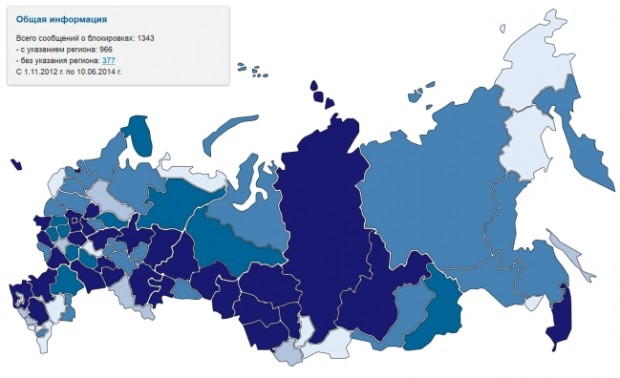
Map by Roskomsvoboda.
Map of 1,343 Internet site blocks in Russia; 966 show region, 377 without region, from 1.11.2012 to 10.06.2014
Roskomnadzor has published a draft regulation concerning the method for counting readership, reports Roskomsvoboda: self-reporting by the “organizers of the dissemination of information” themselves on traffic statistics.
In the absence of such information, Roskomnadzor has the right to get the information from hosts or servers that calculate traffic, either open-access services or special computer programs that enable the determination of the number of site users. In the event disputes arose, Roskomnadzor would use its own monitoring statistics.
The draft also stipulates that “visitor” would be defined as a unique user per 24-hour period who completely loaded the site into his browser for at least a 15-second session.
June 10, 2014
1452 GMT: A reader writes, regarding our story about an account claiming to be that of Kremlin advisor Vladislav Surkov (@SurkovRussia):
@Interpreter_Mag He has denied the account is his in the past though http://t.co/3dZ1YbGXxI
— Paul O'Mahony (@OMahonyPaul) June 8, 2014
Indeed, Surkov was quoted by Interfax on 13 January 2013 denying the account was his:
“Russian Deputy Prime Minister Vladislav Surkov does not do social media and the Twitter account in his name, although “witty and sometimes even funny”, is an impostor, Interfax news agency reported on 15 January.
Surkov conceded that the account had fooled many. ‘My friends increasingly think that @SurkovRussia is actually me,” he told an Interfax correspondent. “They ask me about it and even compliment me. But I have to tell them that this account is nothing to do with me, directly or indirectly.’
In fact, he neither tweets nor blogs, he continued. ‘During the New Year holiday I had time to take a look at the account. Some of it is witty and sometimes even funny but it’s not me. I don’t have any social media accounts at all, of any kind. That might be unusual in this day and age, but it’s true.'”
So yes, Surkov said account had “nothing to do with me, directly or indirectly” a year an a half ago, although with a wink and nod that he finds it funny. He doesn’t disavow the views in it and even say his friends think it’s him. But what has he done lately? This account has continued to run, has gained over 70,000 followers and just last week quipped that an ICBM missile lobbed at the newly-elected Ukrainian President Poroshenko would liven up the event. Did the real Surkov disassociate himself from this awful statement? No.
Imagine if a parody account appeared under the name of Victoria Nuland, the State Department official whose private conversations on Ukraine were hacked and posted to YouTube, and that account began making such outrageous statements. Not only would it be a scandal in the US; Russia would go wild and demand retractions. Yet for Surkov, there’s a double standard, we’re to accept that long ago, he technically disassociated himself from this account once, and then keep on letting him off the hook.
Surkov is called the “Kremlin’s grey cardinal” for good reason — he has started numerous front groups and political active measures and infiltrated social movements and social media with government operatives. Clearly @SurkovRussia is a “resource” he benefits from even if hands-free.
Кандидат порошенко: "Я уйду из бизнеса!"
Президент порошенко: "Я ищу компанию, кот. займётся продажей моего бизнеса."
Украинцы, вы лохи.
— Сурковъ (@SurkovRussia) June 10, 2014
Translation: @SurkovRussia Candidate Poroshenko: “I will leave business”; President Poroshenko; “I am looking for a company that will sell my business.” Ukrainians, you are dupes.
Уничтожил одним взглядом… pic.twitter.com/3JBtjhAGVd
— Сурковъ (@SurkovRussia) June 6, 2014
Translation: @SurkovRussia Destroyed with one glance.
1024 GMT: Russian journalists and bloggers have challenged a story in Ekho Moskvy about the bodies of Russian fighters in Donetsk being returned to Russia for burial, regarding a claim that the alleged biography of one of the soldiers killed proves the presence of the FSB in combat operations in southeastern Ukraine.
As we reported on our Ukraine blog, the original story in Ekho Moskvy has been translated by Atlantic Council. Last week, we had excerpted the “Cargo 200” story noting that journalists were able to confirm only a few names from death certificates accompanying the coffins, but we did not include the FSB claim because no links were provided by Ekho Moskvy.
In the original story, journalist Mariya had this paragraph, without any links:
“Mr. Zhdanovich, Sergei Borisovich, born 1966.
Information has already appeared about him in social networks
In the Vkontakte group “Afganistan. Nothing is forgotten, no one is forgotten,” people write that he was a retired instructor of the FSB’s Center for Special Assignments [spetsnaz], a veteran of the [wars in] Afganistan and Chechnya. They also report that on 19 May, he had come to Rostov-on-Don for training and 26 May was killed in Donetsk.”
We looked up the group, which exists, but no such message about the FSB can be found there. There’s a notice of his death with his name, and a link to another page, “Krasny Put’ [Red Path]/Antimaidan” which contained a longer notice about him:
“Information came in today that our comrade, Sergei Zhdanovich, died at the hands of enemies. The man has passed through Afghanistan, passed through Chechnya, and was involved in military patriotic games. He could not leave without attention the war against the people now. On the 19th, he went to recruitment in Rostov-on-Don. On 26 May he fell in battle, through the death of the brave.”
There are no comments about the FSB at all. To be sure, they could have been removed on either page by moderators or users themselves, but usually people notice and comment on such things, if not on the pages in question, on other forums. On this forum, in fact there’s a collective effort to debunk the FSB claim.
But more likely, the notion of his alleged FSB affiliation was interpolated somewhere in the chain — it isn’t the first time we have seen “social network pages” cited as “definitive” by Russian media which lead nowhere, or to removed pages, or to disinformation. Social media pages have become so ubiquitous (and authoritative for people) that Ukrainian officials have taken to using their own Facebook pages to issue official announcements, and many useful reports from citizen journalists have come from international or regional social networks. But anonymous and highly editable accounts have also been exploited to spread some of the worst propaganda and disinformation as well.
On the Krasny Put’ page, there is also a rebuttal of Ekho Moskvy, which is also posted on Odnoklassniki, which appears to be from a relative, as follows:
“Kseniya Zhdanvocih
Once again on the lies in the Ukrainian media. Their cynicism knows no limit.
Yesterday, about 17:00 I asked a few groups to place information about a comrade who died – Sergei Zhdanovich, who according to current, but unchecked information, died together with three militiamen, whose identifies could not be established at this time. Sergei was an ordinary rank-and-file soldier, he returned from Chechnya with the rank of master sergeant. He was in the Paratroopers’ Brotherhood of the Noginsk District. All of this information can be found on the Internet. He never was in the spetsnaz, he never was an officer of the FSB and other such services. He was an ordinary grunt, as the folk saying has it.”
A story like this gets legs because English-language blogs like this one cited the “FSB” claim, linking to Russian-language sources that few clicked through to see that in fact that the source didn’t even contain a mention of the FSB.
Independent news site Novaya Gazeta decided to step outside of social media virtuality and followed up on Mariya Turchenkova’s original story in real life. They could not confirm the FSB connection.
They contacted the office of Roman Tikunov, the chairman of the executive committee of the local branch of United Russia in Elektrogorod, who was organizing Zhdanovich’s funeral. They said he had volunteered to serve in the Crimea, but not been taken, and then on 14 May was summoned immediately to Rostov-on-Don for service in Donetsk.
Zhdanovich was born in 1966, had served in the Pacific Fleet guarding ballistic missles, then worked in the Sokolniki patrol service of the Interior Ministry. In 2000, he was assigned to Chechnya, and then after the war headed a veterans’ organization called Boyevoye Bratsvo [Combat Brotherhood] and joined United Russia, and was elected into the local city council from that party.
Novaya Gazeta supplied the additional information about the various companies that Tikunov, a fellow member of the Combat Brotherhood and his fellow United Russian party members had formed in Elektrogorod.
They also contacted his brother:
“Alexey Zhdanovich: There is no information. Tikunov said that he was involved in bringing refugees out of Donetsk. They promised that on 6 June, the body of my brother will be brought to the Ramenskoye airport or they will bring it to Podolsk.
Novaya Gazeta: “Ukrainian media say that your brother served in the FSB.”
Alexey Zhdanovich: He never served in the FSB. Only in the police…”
So, at this point, it looks like there is no confirmation from regional media, social media, and relatives regarding Zhdanovich’s FSB status. The original quotation by Ekho Moskvy‘s Turchenkova of VKontakte pages did not contain links, but those found did not support that claim. Further research by another paper, Novaya Gazeta, has not confirmed the claim. So while it is more than likely that the FSB, like the GRU, is actively present in the Ukrainian conflict, this particular death has not proved it.
June 9, 2014
1424 GMT: The murderers of famous investigative journalist Anna Politkovskaya were sentenced in Moscow City Court to life imprisonment today, but the contractor of the assassination was never arrested, Gazeta.ru reported.
Hitman Rustam Makhmudov was sentenced to life imprisonment, along with organizer Lom-Ali Gaytukayev, and accomplices Ibragim Makhmudov and and Dzhabrail Makhmudov were sentenced to 12 and 14 years of imprisonment, respectively.
Yet the children of Politkovskaya, who was gunned down in her apartment elevator in 2006, continued to insist on a continued search for the contractor. The Interpreter has translated an excerpt from the report:
“From early morning, there were crowds of journalists in the court room, colleagues of Anna Politkovskaya, lawyers and relatives, both on the side of the victims and on the side of the convicts. They had waited for this day for almost 8 years, and making the rounds of courts had become almost routine for them; all around were familiar faces, the same conversations, and one and the same question, remaining open to this day. Neither the plaintiffs nor the relatives of the convinces nor the media had a unified version about who ordered the murder of the 48-year-old journalist from Novaya Gazeta.”
Politkovskaya’s son Ilya told journalists that the verdict was fair but he would not be satisfied until the real contractor of the murder was found.
“We’re prepared for dialogue with anyone who can help us with this, and with those convicted as well, we’re prepared to cooperate with those who will conduct a search for the contractor.”
Vladimir Markin, spokesman for the Investigative Committee said “exhaustive measures were being undertaken to establish the contractor of the murder of Anna Politkovskaya, a criminal case regarding this has been moved to a separate investigation.”
Few had expected life imprisonment. Shockingly, one of the relatives complained to Gazeta.ru that Novaya Gazeta should blame itself.
“Who is the contractor? Ask the investigation. Novaya Gazeta ordered it themselves, they have grown rich on this, their ratings have gone up. There is no evidence that this was done by those tried.”
A lawyer for one of the defendants said that a witness had not come forward until the reward was offered, and then it was only hear-say. Attorneys were preparing an appeal of the sentence, citing violations of due process.
Novaya Gazeta has provided exhaustive coverage of the murder and all the numerous trial sessions that have ensued for the last 8 years, but had not yet updated its page on the sentencing.
Politkovskaya was known for her frequent trips to report on the Chechen wars and the Nord Ost terrorist attack on a theater in Moscow; she also covered corruption in the Defense Ministry.

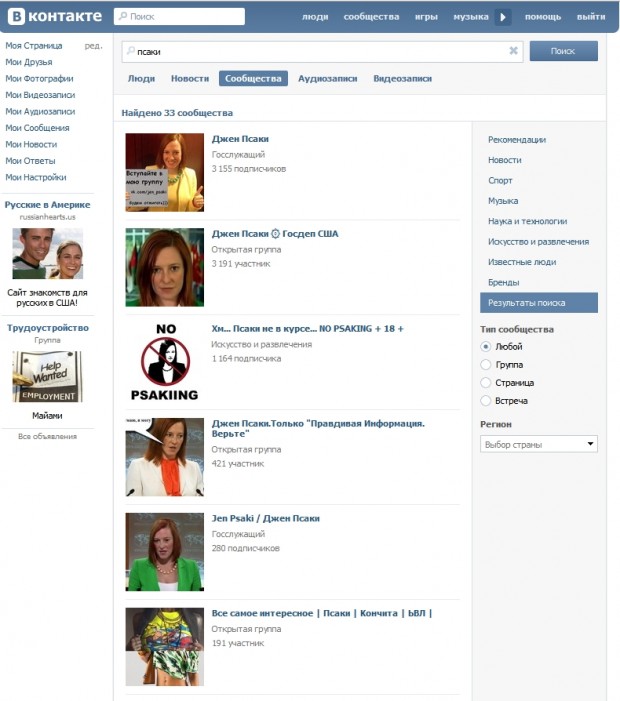
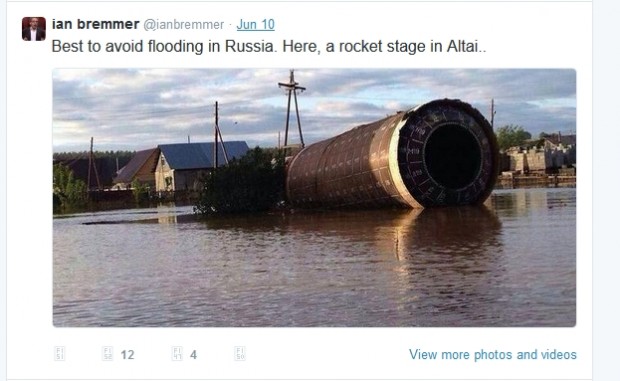
![Still from the film "Prikazana zabit'" [Ordered to Forget] by Ruslan Kokanayev.](https://www.interpretermag.com/wp-content/uploads/sites/5/2014/06/140224065540_chechen_ingush_512x288_rianovosti.jpg)
